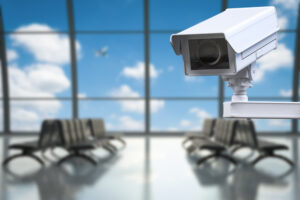Security Systems: Choosing The Best CCTV Surveillance System That Works For You
 September 28, 2021 Uncategorized 0 Comment
September 28, 2021 Uncategorized 0 Comment Closed-circuit televisions (CCTV) systems use a single channel to transmit video, forming a closed circuit. Ultimately, this means that footage is only seen on a small number of personal monitors rather than being broadcast publicly. This post will go through CCTV surveillance systems in detail, including what they are and the varieties available to help you choose the ideal equipment for your needs.
What you need to know about CCTV surveillance systems:
A CCTV system mainly consists of a camera, lens, recorder, and monitor. The cameras are in charge of employing image sensors to capture footage through the lens. In exchange, these videos and sounds are sent wirelessly or by connection to the recorder or cassette. Specifically, depending on the system type, CCTV surveillance systems are connected through coaxial cable, network cable, or wireless signal.
Meanwhile, recorders may scan the data using analytical software and other intelligent technologies, sending automatic alerts to people or other systems and devices. On the other hand, monitors can be monitored passively via software or actively by humans.
The different types of CCTV surveillance Systems:
Before we go to the specifics, you first need to know about the two main categories of security cameras:
Analog CCTV Systems: The camera and the surveillance monitor or recording system of these devices are connected through coaxial wires. This ultimately means that they deliver video to VCRs or DVRs via cable.
IP Systems: On the other hand, Internet Protocol (IP) refers to a digital video camera that can transmit and receive data over a computer network.
In comparison, IP cameras give better video quality than analog cameras. They have a wider choice of video site options, such as a broad or restricted field of vision, as well as superior zoom-in capabilities. In addition, analog CCTV systems take more effort to install than IP systems since they require more wiring.
Moving on, let us go into the more specific types of surveillance cameras:
1. Dome cameras: This type is widely known as the most economical choice out of all the alternatives. As the name suggests, these devices exhibit a dome shape. Furthermore, they are great at capturing wide-angle footage, which is beneficial for retail establishments, hotels, and restaurants.
2. Pan, tilt, and zoom (PTZ) cameras: On the other hand, pan, tilt, and zoom (PTZ) cameras are frequently featured in movies operated by an app, joystick, or computer program. What that, they are ideal when you need to look into specific sections of the covered area. This makes them good in places that carry a lot of valuables.
3. Bullet cameras: Ideal for the home, bullet cameras are specifically designed to capture the visuals of fixed places. Furthermore, their sizes are notably smaller and cylindrical.
4. License plate reader (LPR) cameras: Since they examine small license plates, LPR cameras render high-resolution sensors useful during both the day and night.
5.Box cameras: Useful for the outdoors, box cameras can be implemented for crime prevention. To add to that, they are also known to withstand some harsh weather.
6. Thermal cameras: Of course, thermal cameras implement technology that can quickly detect both objects and people. They generally work by spotting infrared energy and converting it into images.
7. Wireless CCTV cameras: Alternative wireless transmission techniques are available for these types of cameras. Therefore, wireless CCTV cameras are not always IP-based. Furthermore, these devices are known for their versatility and convenience.
Overall, your choice will be based on your ultimate purpose of having a surveillance system. Some of these types are ideal at home, while others work better for wide-range or outdoor areas.
.
Why you need a surveillance system:
Installing security cameras on your site may help you whether you operate in a commercial or industrial setting. While they are excellent in deterring crime, these devices are helpful for more than just that. With that said, the following are some reasons why you need a surveillance system in your home or office:
Enhances security: The primary reason to install a home security system is to protect your family and belongings. Installing security cameras is a smart alternative to hiring security personnel. Therefore, these devices are now required for banks and companies with strict security policies and for small enterprises and private houses.
Protect oneself against legal action: Given the possibility of falls, slips, and other mishaps at work, it is preferable if all of them are caught and documented. It will not only offer clear records of when and where accidents occur, but it will also assist you in improving your safety routine. Most importantly, if someone will wrongfully attempt legal action against you, your monitoring equipment will help prove your innocence.
Increased work productivity: With surveillance cameras, you can have your floor supervisors focus on more essential tasks rather than performing constant inspections and observations. Also, it is just natural that people perform better when they know they are being watched. Therefore, with the knowledge of having these devices installed in your workplace, employees will undoubtedly become more mindful of their actions.
Ideal for fire protection: While most people think of home security systems as a method to keep their houses safe from intruders, many people are unaware that they may also keep their homes safe from fires. You can use these devices to alert you upon the presence of smoke in the house as well as heat sources.
Peace of mind: The presence of a CCTV system deters theft and damage. Not only that, but if you do encounter such crimes, you will carry solid proof of who did it and when. When you need to produce evidence for police investigations, this can save you a lot of time and effort.


